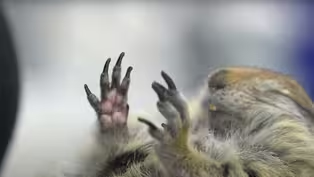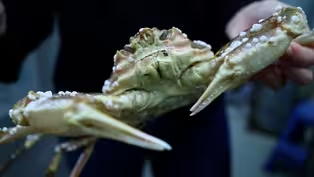Alaska Insight
Meet the Arctic Ground Squirrel
Clip: Season 6 | 3m 8sVideo has Closed Captions
Find out why scientists are studying this cozy Alaskan critter
Meet the arctic ground squirrel. This mammal can chill its body down to the freezing point, 32 degrees Fahrenheit, during hibernation and then wake up fine in the springtime. Find out why scientists are studying this cozy Alaskan critter and how they could help to improve our understanding of healthcare for humans.
Problems playing video? | Closed Captioning Feedback
Problems playing video? | Closed Captioning Feedback
Alaska Insight is a local public television program presented by AK
Alaska Insight
Meet the Arctic Ground Squirrel
Clip: Season 6 | 3m 8sVideo has Closed Captions
Meet the arctic ground squirrel. This mammal can chill its body down to the freezing point, 32 degrees Fahrenheit, during hibernation and then wake up fine in the springtime. Find out why scientists are studying this cozy Alaskan critter and how they could help to improve our understanding of healthcare for humans.
Problems playing video? | Closed Captioning Feedback
How to Watch Alaska Insight
Alaska Insight is available to stream on pbs.org and the free PBS App, available on iPhone, Apple TV, Android TV, Android smartphones, Amazon Fire TV, Amazon Fire Tablet, Roku, Samsung Smart TV, and Vizio.
Providing Support for PBS.org
Learn Moreabout PBS online sponsorshipThis little squirrel just came out of the freezer, but it's not dead.
And scientists like Sarah Rice want to know why there's no cardiac arrest.
There's no stroke there.
Obese, but there's no ill effects.
There's no bone loss.
This is an arctic ground squirrel.
And during hibernation, it can chill its body down to the freezing point, 32 degrees Fahrenheit.
It's the only mammal that we know can get that cold.
And they wake up and they're just fine in the springtime.
Here at the University of Alaska, Fairbanks, researchers are trying to understand the biological mechanisms that allow squirrels to withstand such extreme conditions and bounce back completely healthy.
They found that when the squirrels hibernate, they cycle in and out of a deep sleep called torpor.
They're in torpor for.
Weeks at a time.
Where they're super, super cold.
The heartbeat maybe five times a minute.
They breathe once a minute and they're just inactive.
Arctic ground Squirrels hibernate because harsh winters limit their ability to find food for much of the year.
But every few weeks they slowly warm their bodies to make glucose, proteins and immune cells.
Basically everything their bodies need to do to keep living.
So how do they do it?
If researchers here can figure it out, it might help them develop drugs that could mimic hibernation in humans.
Biologist Kelly Drew says hibernation might help patients with critical brain injuries, like someone who's just had a stroke.
The optimal therapy for somebody who has a brain injury is to either stop fever or to cool the body.
And the best way to do that is through the same mechanism that the ground squirrels do to turn down the thermostat.
Drew's small team of scientists is working on creating a drug to chemically turn down the body's thermostat like squirrels do in hibernation.
They're focused on certain receptors in the brain called adenosine A1.
Her hope is that a drug that stimulates A1 receptors in human brains could be part of an effective treatment for stroke or other brain injuries, or even promote brain health as we age.
The other thing that cooling and rewarming does to the brain is it also creates these regeneration of synapses and maybe even neurons.
And so for things like mental health, I think cooling and rewarming could be remarkable because it promotes plasticity.
Same with neurodegenerative diseases like Alzheimer's.
So far, Drew says, the drug has shown promising results in rats and pigs.
The drug testing process is long and rigorous.
If it works, it could be 5 to 10 years before it has final FDA approval for human use.
Drew says NASA has even shown an interest in the potential to put astronauts in a hibernation like state to aid space travel.
The seven month trip to Mars would be a lot more pleasant in a hibernation bubble.
Meet the Arctic Ground Squirrel
Video has Closed Captions
Clip: S6 | 3m 8s | Find out why scientists are studying this cozy Alaskan critter (3m 8s)
Investigating the case of missing snow crabs in Alaska
Video has Closed Captions
Clip: S6 | 4m 17s | How did ten billion snow crabs disappear between the years 2018 and 2022? (4m 17s)
Providing Support for PBS.org
Learn Moreabout PBS online sponsorship
- News and Public Affairs

Top journalists deliver compelling original analysis of the hour's headlines.

- News and Public Affairs

FRONTLINE is investigative journalism that questions, explains and changes our world.












Support for PBS provided by:
Alaska Insight is a local public television program presented by AK

